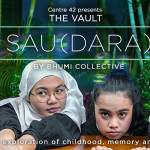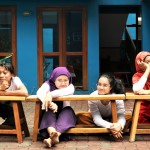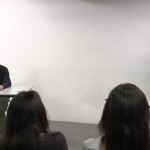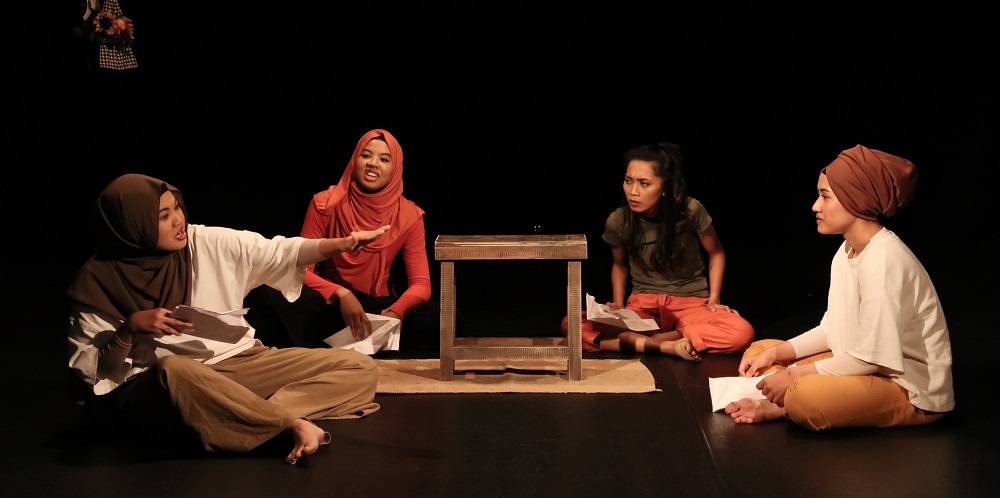
“Sau(dara)” was performed as part of a double bill, which was co-presented by Centre 42 and Malaysia’s Five Arts Centre in March 2019.
As an applied theatre practitioner, I am most interested in the phenomenological human condition. Essentially, phenomenology is the study of structures of consciousness, as experienced from the first-person point of view. We are each the complex sum of our experiences. As Sau(dara)’s dramaturg, I am interested in an individual artist’s intentionality within the work. I seek to place his or her direct experience of participating in a creative process under a magnifying glass, for it is an intersectional human context that I will endeavour to comprehend.
As a dramaturg working with an eclectic ensemble of artists from various backgrounds and artistic disciplines, nothing stimulates me more than sitting down over coffee and simply getting to know my multi-disciplinary collaborators as human beings. As we embark on the mission to create a multi-disciplinary and highly personal response to Leow Puay Tin’s seminal play Three Children, I was keen to create the space for everyone to mull over two things. The first is the team’s creative input (sharing personal stories, finding common ground as modern Malay women in Singapore), and the second is their degree of autonomy (the process of giving and receiving direction, breaking out of their comfort zones) in a creative process. As usual, the more I learn, the more I realise how much I don’t know.
That was exactly what we did on the first day I joined the team in January 2019. At that point, Sau(dara) had already showcased its first iteration under Centre 42’s The Vault, and it was going to be reworked to form part of a double bill called Are You Game, Sau(dara)?, which would be staged in both Kuala Lumpur and Singapore. The cast and I spent our first four hours together responding to a single line, “Tell me about your journey as a performer”. The sociological paradigm of the modern Malay Muslim woman who chooses the performing arts as her vocation, be it as a musician, a traditional or contemporary dancer or vocalist in a band, is worth excavating and analysed from a dramaturgical perspective. In Singapore, she is the minority amongst minorities. In Kuala Lumpur, maybe she is? Maybe she’s not? What a delicious point of inquiry!
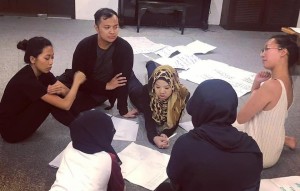
The “Sau(dara)” team, including Grace (far right) rehearsing at Centre 42. Photo: Bhumi Collective
As Amin’s second pair of eyes, my area of observations and probes ranges from stage blocking, set and lighting design to the cast-generated play script. A concrete example would be my perspective of the opening scene in the original cast-generated text. Titled “Summary”, the scene was confessional, a generous invitation into the world of four saudaras – young maidens facing days of gentle breeze, raging winds, blazing heat and everything in between. The scene was emotionally driven, replete with strong, impassioned vocabulary such as shame, disappointment or the sense of being put one’s place. It was also vague and inaccessible to me, as I hold the standpoint that we cannot impose feelings on the audience. We can, however, encourage and cultivate it. I consulted with Amin and the cast to disclose gritty details, to visit the real events that resulted in those lingering emotions, and eventually to share them with an audience.
A reaffirming takeaway is that it takes a bedrock of trust to facilitate such an intimate process and I am thankful to be able to draw from my Theatre for Development (TFD) experiences. TFD is a participatory theatre practice that allows communities to write their own stories, and perform them in a drama based on the messages that emerge from the storytelling process. It is a practice that operates from the performers’ perspectives. From day one, Amin and I shared the consensus that our performers must use their own language and idioms of expression. In a sense, Sau(dara) is a truly performer-centred work, where both the director and dramaturg had to work conscientiously together to demystify the ‘expert syndrome’ within the rehearsal room.
Another example, which I would fondly cherish, is traditional Malay dancer [Nurul] Farahani literally finding her inner roar within the context of fighting over a seat on the bench, which we lovingly refer to as “bangku” (Malay for bench). Nearing the end of the performance, in Scene 10, the bangku is literally a seat at the table coveted by all the young artists. Sweet Farahani’s instinct is to avoid the scrum; she would not allow herself to last for more than a second in the struggle. Three weeks into the process, we organically found the space for a conversation of how art compels us to venture into new territory and gain new experiences safely. Scene 10 demanded her grit and tenacity, and it would only work if she summoned enough courage and energy while banishing her instinct to avoid confrontation. Farahani had nothing to lose in the rehearsal room and after a particular invigorating attempt, I asked her if she liked what she just experienced. She said she did, and that scene was never the same again. The applied theatre practitioner in me also slipped in a little suggestion: that what she discovered in the safety of the rehearsal room was hers to keep. If she liked that feisty, unrelenting Farahani on the bench, she can keep her, bring her into real life and the real Farahani will never be the same again. Much like Scene 10.
I constantly scrutinise my role as a dramaturg and how it evolves in different contexts of collaboration. In the case of Sau(dara), my duty was to pinpoint the DNA of the response to Three Children. Within this context, the DNA lies in the four young Malay female performers who Amin wants to empower, and what they are searching for. Theatre-making is essentially a rehearsal for real life, and I’m always trying to get a sense of the performers’ personhood through playing drama games. Through play, I record their authentic interactions with the original play and open them up for discussion and reflection in the rehearsal room. It is the opposite of escapism through performance making. The Sau(dara) team collectively discovered that they should look backwards in order to move forwards. Amin and I witnessed transformative qualities in each and every performer as they grew in confidence, by locating their professional and personal centres and identifying the directions they want to work towards. This is a result of their complete ownership in Sau(dara).
By Grace Lee-Khoo
Published on 5 April 2019
Find out more about The Vault: Sau(dara) here and Are You Game, Sau(dara)? here.

